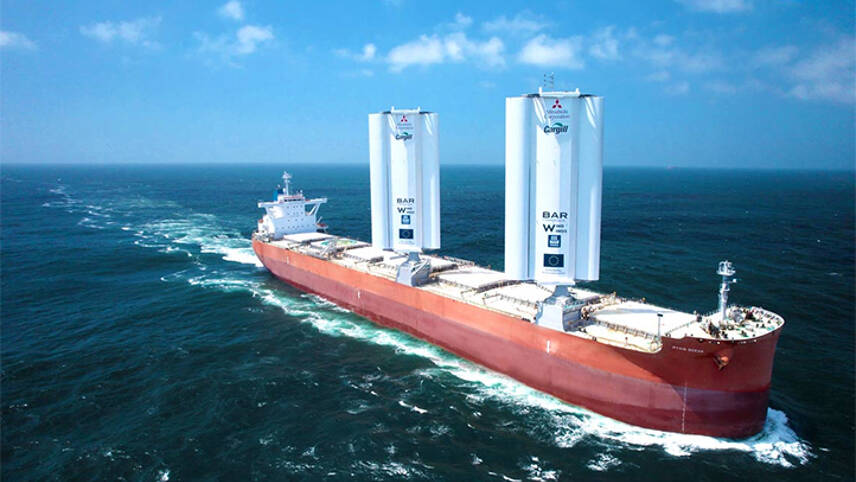Register for free and continue reading
Join our growing army of changemakers and get unlimited access to our premium content

Image: Cargill
Mitsubishi Corporation’s Pyxis Ocean vessel, chartered by Cargill, has been fitted with BAR Tech WindWings by Yara Marine. Two WindWings, which are large sails measuring more than 37m in height, have been fitted to the deck of the cargo ship.
The wings are expected to generate average fuel and emissions savings of up to 30% on new build vessels, which could also be combined with low-carbon fuels to generate further savings. The wings were fitted to the Pyxis Ocean in China and the vessel is now conducting her maiden voyage.
Results from the voyage will be used to inform the scale-up of the technology with Cargill wishing to adopt it across its fleet. BAR Technologies and Yara Marine Technologies are already planning to build hundreds of wings over the next four years.
“The maritime industry is on a journey to decarbonize—it’s not an easy one, but it is an exciting one,” Cargill’s president of ocean transportation Jan Dieleman said. “At Cargill we have a responsibility to pioneer decarbonizing solutions across all our supply chains to meet our customer’s needs and the needs of the planet.
“A technology like WindWings doesn’t come without risk, and as an industry leader – in partnership with visionary shipowner Mitsubishi Corporation – we are not afraid to invest, take those risks and be transparent with our learnings to help our partners in maritime transition to a more sustainable future.”
The collaboration has been co-funded by the European Union as part of the CHEK Horizon 2020 initiative. One major benefit is that it offers a retrofit solution to help decarbonise existing vessels. Currently, more than half of the world’s bulker fleets have been on the seas for up to nine years.
The trial comes in the some month that many firms in the maritime sector were called out for lagging on decarbonisation efforts.
The Ship It Zero campaign’s first Shipping Decarbonisation Report Card assessed major retailers and shipping carriers based on their commitment to decarbonisation and zero-emission fuels for maritime transport.
It revealed that shipping firms were falling behind in efforts to address the climate crisis, with the majority of retailers relying on shipping also receiving failing grades for slow adoption of decarbonisation measures.
According to an International Council of Clean Transportation (ICCT) report, the worldwide shipping sector contributes 3% of total global climate emissions, surpassing the emissions from global air travel.
Last month, the IMO adopted an updated GHG strategy for shipping, setting 30% and 80% emissions reduction goals for 2030 and 2040. However, green groups asserted that the measures did not meet scientists’ deemed requirements for the shipping sector to effectively tackle climate change.


Please login or Register to leave a comment.